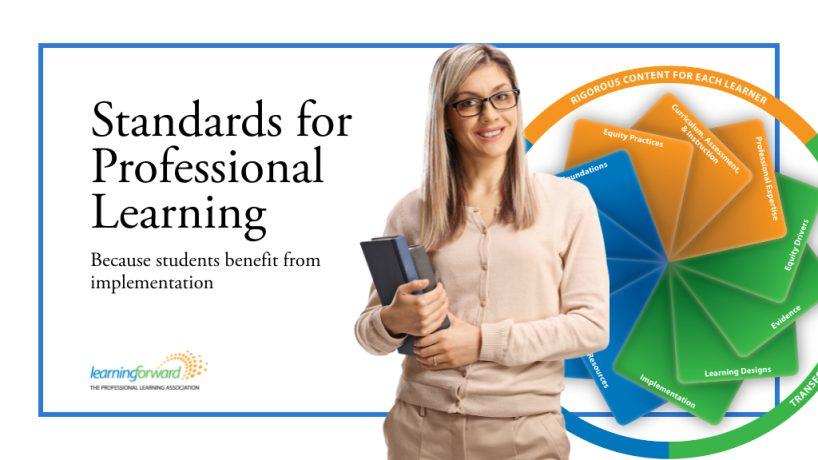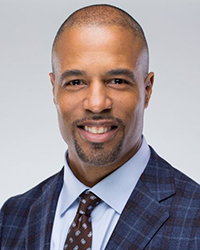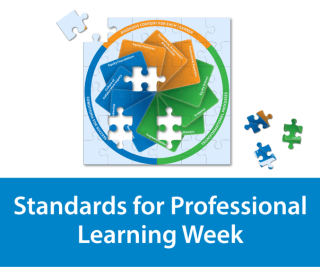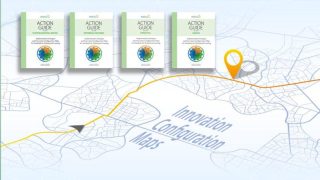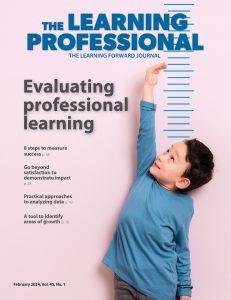Welcome to Standards for Professional Learning Week 2023! I hope you celebrate with us by joining our live daily presentations focused on topics that address pressing issues for educators right now: advancing outcomes for all learners; elevating educator voices; embedding equity; examining impact; and advocating for support and equitable funding to ensure high-quality professional learning is available to all educators.
I am especially excited to announce a new suite of standards implementation tools Learning Forward is introducing this week. Each day’s webinar will be followed by a Standards Lab session during which participants can dig into new resources to deepen their understanding of the standards and strategies for implementing them.
One year ago, Learning Forward kicked off revised professional learning standards with a week of opportunities to learn about the standards and hear from key stakeholders about the design process and recommendations for implementation. The revision marked the fourth since the standards were founded in the mid-1990s by National Staff Development Council (which later became Learning Forward.) Over the last 30 years we have revised the standards to reflect emerging research, new knowledge about best practices, and policy shifts.
Last year’s standards launch week webinars attracted a viewing attendance of more than 2,500 individuals. The launch marked a new era of our support for standards implementation. We have accomplished a lot, starting with standards training for Learning Forward staff, affiliate leaders, and Learning Forward Foundation board members. We developed standards curriculum for and/or led numerous in-person and virtual learning sessions including:
- For Mississippi, where school leaders across six sites received standards training.
- For Arizona, where the state Department of Education Division of Adult Education Education held a daylong standards training as part of a yearlong “Becoming a Learning Team” series.
- For the U.S. Department of Education’s State Personnel Development Grants (SPDG) program, which provides grants to state educational agencies focused on professional development needs;
- For the State Technology Educational Directors Association’s (SETDA), Title II coalition.
- For education leaders who wanted to deepen their understanding of how the professional learning standards intersect and work with other standards, including Professional Standards for Educational Leaders (PSEL) and National Educational Leadership Preparation standards.
In Nashville, our 2022 Annual Conference featured numerous opportunities for 3,300 conference goers to attend standards-focused sessions, including seven Standards Labs that held small-group immersive discussions moderated by experts in professional learning and the standards.
An online course and curriculum for multi-day in-person learning sessions to build understanding about the standards and resources were developed and launched. Standards for Professional Learning has sold more than 7,000 copies from our online and conference bookstores.
The Learning Professional’s June 2022 issue is entirely dedicated to standards-related articles, data graphics, and opinion pieces.
Throughout the year we have heard from state, provincial, and district leaders about how well the standards are shaping their professional learning system goals and strategic priorities. These goals range from statewide adoption of the standards to redesigning Title II and school improvement plans to increasing the awareness and usage of high-quality curriculum and instructional materials.
System and school teams have told us they see themselves and their roles reflected in the standards. They are drawing support from the many resources released alongside the standards, including the website, which has attracted 40,000+ global visitors who have viewed or downloaded more than 5,500 resource documents, with the most-popular being: the standards summary; the quick start guide; the research summary; the “why and how to adopt” policy paper; and role-specific action guides.
Because of the inclusion of our three new equity standards (Equity Practices, Equity Drivers, and Equity Foundations) we have heard about numerous conversations taking place about the different dimensions of equity and how these dimensions impact educator and student outcomes.
Implementation is everything
In a recent Education Week article, I appreciate Frederick Hess’ observation of what makes implementation the critical issue in education improvement: “What matters in schooling is what actually happens to 50 million kids in 100,000 schools. That’s all implementation.”
I have said often that a key outcome of professional learning is the implementation of new practices tied to that learning. When that happens, our students benefit.
We know that implementation matters! In that “implementation spirit,“ every day this week, our new standards implementation tools will be demonstrated. Some of the resources you will see this week:
Advancing outcomes of all learners: For schools and systems seeking to overcome specific barriers or identify a cause of lingering challenges, this tool has what you need. It points to the standard that would begin to address each challenge.
Vignettes: A variety of narratives informed by actual events that portray how a standard plays out in a particular learning context and realistically portrays a learning journey over time.
Action guides with Innovation Configuration maps: This role-based tool both guides initial thinking about standards and illustrates specific concrete actions that lead to individual and collective implementation of the standards.
Policy pathways: A tool that provides a variety of policy implementation pathways connected to the standards.
The Standards Assessment Inventory, or SAI, provides valid and reliable data to help systems measure the alignment of their current professional learning practices to the standards, and to assess how well their professional learning meets the needs of their instructional staff. During the 2 1/2-year period Learning Forward was working on standards revision, we asked our state affiliates, members, and clients what was important to them. Their answer was how best to use and implement the standards systemically. The newly revised SAI is an incredible tool that helps schools and systems focus on the systemwide actions that contribute to high-quality professional learning.
Selected resources for equity challenges: A tool that aligns rich resources Learning Forward has developed and produced over time with common challenges faced by systems and schools today.
We can’t wait to get these new tools in the hands of educators and help expand productive conversations about the standards.

